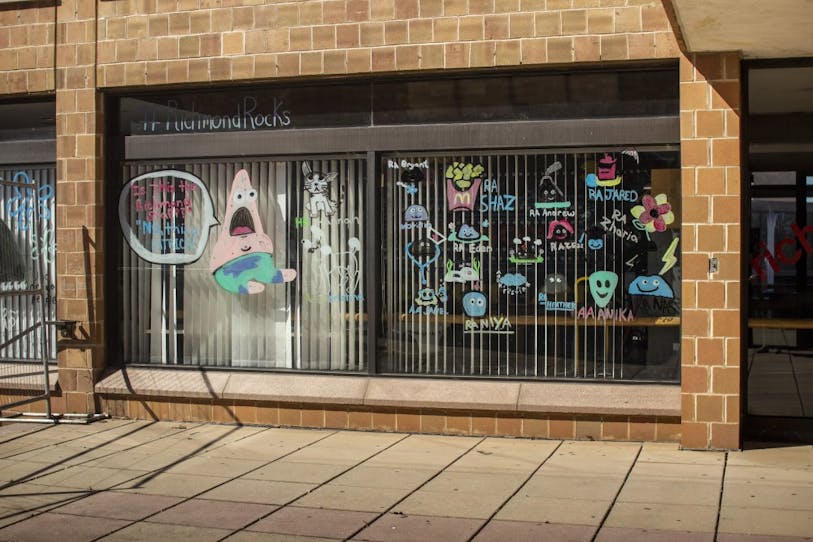For years, resident advisers have told The Spectrum they can’t talk about their classroom experiences without Campus Living approval.
Some said they can’t even talk about Sizzles’ burgers.
Why?
They said Campus Living “doesn’t allow” them.
When students become RAs or CAs, they have to sign an agreement. The agreement references Campus Living’s “Student Staff Code of Ethics,” which states that student employees cannot speak to the media without professional permission. Legal experts say this language is “overly broad” and could be a violation of students’ First Amendment rights.
“An RA has a legal right to speak as an individual about personal experiences and observations and about working conditions, and the employer has no authority to control that speech or to impose punishment for it,” said Frank LoMonte, a media law expert and director of the Brechner Center for Freedom of Information at the University of Florida.
Campus Living Senior Associate Director Brian Haggerty wrote the agreement “does not limit RAs from speaking with the media from the perspective of a UB student.”
Students, he said, are free to ask if they have questions about the policy. “We approach each year with a reasonable expectation that new staff will seek some clarification about their job expectations,” Haggerty wrote in an email.
He wrote that he would make the policy more clear for incoming students in August.
Legal experts say, as a public university, UB has some control over non-student employee speech. Still, they said Campus Living’s code has “overly broad” language and it raises questions over First Amendment violations of college students’ free speech.
Haggerty wrote that the code does not “represent a contractual relationship,” although they still have to sign a document and verify they understand the code.
The document they sign includes a statement of agreement that says they “must abide” by their “job description (including the code of ethics).”
LoMonte said whether a document is referred to as a “contract,” “rule” or “policy,” you can’t force people to surrender First Amendment rights as a condition of employment. He said it’s fine if the agreement says they’ll respect residents’ confidential information but a blanket “don’t talk to the media without approval” prohibition “goes too far.”
Can RAs talk to the media?
In early January, a Spectrum reporter asked a student for a reaction on a story about campus food.
She declined to comment and said it was because she is an RA.
LoMonte said the student’s response is “the exact risk of an overly broad policy.” LoMonte said if a person gave an interview and spoke as a Campus Dining & Shops customer and got fired by Campus Living, it would be a “slam dunk” First Amendment case in any U.S. court.
“You couldn’t possibly say, ‘Well, when we told you to sign this confidentiality agreement, we literally meant that you forfeit all of your rights attached to the media 24/7 about any subject,’” LoMonte said.
Harshita Girase, a senior computer science major, was an RA during her sophomore and junior years in the Governors’ Complex.
She said there are situations where she believes she shouldn’t talk to media outlets, like when a student fell from a Goodyear Hall window in 2017. But she said the code of ethics can be interpreted in different ways.
“It doesn’t say what you can talk about and what you can’t. Just to not talk about [anything] is weird,” Girase said. “Well, if someone comes to me and asks me about my experience as a student, can I not share that? Whether it's positive or negative is a different thing, but I think I should be able to talk about [what’s going on] regardless.”
She said the code shouldn’t prevent RAs from talking to outlets as individual students and the code can lead to fear of an unknown consequence.

The RA office at Richmond Quadrangle. Campus Living’s “Student Code of Ethics” states that RAs and CAs cannot speak to the media without professional permission. Legal experts said the code’s language is “overly broad” and could be a violation of students’ First Amendment rights.
Will Creeley, vice president for legal and public advocacy for the Foundation for Individual Rights in Education, said the RA-signed statement of agreement seems to “clearly incorporate” the code of ethics and “notes that the code of ethics is something the employee ‘must’ abide by.”
“It seems to be very reasonable for an RA to imagine that they will also be bound by the code of ethics and could suffer employment consequences for failing to abide by it,” Creeley said. “It doesn’t seem aspirational, it seems mandatory.”
Kari Quimpo, an RA and CA from August 2014 to May 2017, said she remembers Campus Living professional staff telling her the code only covered Campus Living matters.
“I could see how [the code] might be misinterpreted as a blanket statement,” Quimpo said. “I do remember during our meeting that it was explained that, while we are allowed to talk to the media about clubs, we have to be mindful that we are representatives of the paraprofessional community. So I always interpreted it as: I can’t talk about Campus Living, but if I do talk to the media about anything else, I should conduct myself professionally.”
Annie Bennett, a senior biology major and former Governors’ Complex RA, said she remembers her car being involved in a seven-car collision in a parking lot. She said she couldn’t talk to a member of the media after because of her position as an RA.
Bennett said she’s been approached by the media twice in her four years at UB. She interpreted the code to mean RAs shouldn’t speak to the media, which she thought was acceptable.
“You can’t talk bad about living on campus just because we’re representing UB,” Bennett said. “And [what is] really important about the job is that we’re representing UB and you have to surrender your personal feelings.”
“We’re there representing a huge business. They want people to live on campus because it gives them a lot of money. I wouldn’t want to not sell that.”
Bennett is no longer an RA and still said she was worried that her old boss would find out she was talking without permission.
First Amendment freedoms
LoMonte said a public university, such as UB, is a government agency, therefore it’s subject to the First Amendment. He said policies such as Campus Living’s are commonplace at other universities, where employees think they shouldn’t talk to the media even if a policy is not “on the book.”
LoMonte said there are “rights that you can’t make people give away by contract.”
“So we’re really just arguing if freedom of speech is one of those or not,” LoMonte said.
“I think the courts have been pretty clear that you can’t make people sign a broad waiver. You can make them sign a narrow waiver that is actually necessary to do the job, but if you say every interaction you have with the news media needs pre-approval by a government official that's too much. I don't know of any court that has ever upheld a waiver like that in a government workplace.”
Creeley said the rules for government employees are different from the rules of students when it comes to First Amendment protections. Government employees have less First Amendment protections and the government, as an employer, can take action in ways that it could not against a student, he said.
“The government enjoys a greater degree of control over employee speech when they speak as employees in order to ensure the official operation of government function. That being said, what’s somewhat concerning to us at [FIRE], is the fact that several provisions in the [RA] agreement don’t seem to leave much, if any, room for a student employee to comment as a student rather than as an employee. That gives us pause.”
Creeley said RAs are still students and they should be allowed to speak as students. He also noted Campus Living’s policy doesn’t say “you will not make comments on your role as a paraprofessional staff member” and the current one is too broad.
“From a First Amendment standpoint, telling a government employee that he or she can never comment as a private citizen on a matter of public concern without first gaining permission from a government employee to do so, that’s the problem,” Creeley said.
“To be clear, the university does enjoy some discretion over the speech of its employees but this policy, as formulated, doesn’t leave room for RAs to speak as [students], and that’s the problem.”
LoMonte said acceptance determines if something is a contract, as signatures or handshakes could be “legally binding” and seen as a contractual agreement.
“If there is no acceptance — if it’s just something the university distributes and says ‘you are required to live by this’ — then it’s not a contract, it’s more like a regulation. But legally, this distinction makes no difference,” LoMonte said.
“Whether it’s referred to as a policy or a handbook or a contract or a cheese sandwich, it’s still a violation of the First Amendment if it purports to forbid any unapproved contact with the news media.”
Girase said Campus Living should be able to update the “Student Staff Code of Ethics.”
“I think they [are] able to work on it and make it more specific in terms of saying you can talk about your food, stuff and experiences as a college student but don’t talk about stuff that goes on like a suicide [attempt],” Girase said.
“With any event that goes on in an organization, you’ll want to keep it on the down low because you don’t know the exact details. There’s a very high chance the students don’t know what’s going on because the information that they get is not necessarily from the source … I think they should definitely be more explicit about what you can talk about.”
Girase said an opportunity for Campus Living’s two-week, RA/CA training program over the summer is a good opportunity to cover the code.
“Maybe we can dedicate half an hour or a short time to go over it and explain why you can’t talk,” Girase said. “I think it’s important to know the reasoning instead of just saying ‘don’t talk.’”
Benjamin Blanchet and Brenton Blanchet are editors and can be reached at benjamin.blanchet@ubspectrum.com and brenton.blanchet@ubspectrum.com and on Twitter @BenjaminUBSpec and @BrentonBlanchet.

Benjamin Blanchet is the senior engagement editor for The Spectrum. His words have been seen in The Buffalo News (Gusto) and The Sun newspapers of Western New York. Loves cryptoquip and double-doubles.

Brenton J. Blanchet is the 2019-20 editor-in-chief of The Spectrum. His work has appeared in Billboard, Clash Magazine, DJBooth, PopCrush, The Face and more. Ask him about Mariah Carey.




